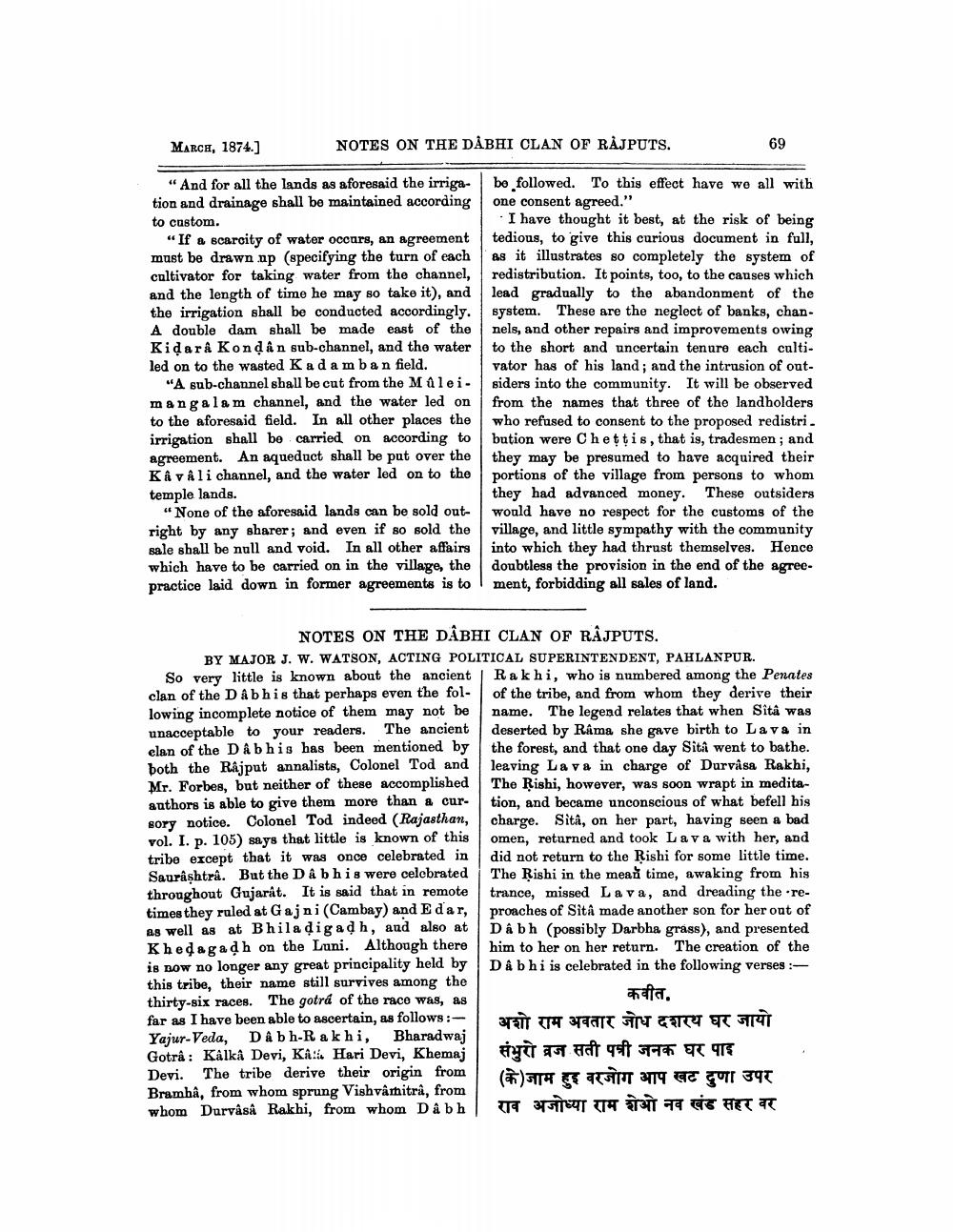________________
MARCA, 1874.)
NOTES ON THE DÅBHI CLAN OF RAJPUTS.
69
"And for all the lands as aforesaid the irriga- tion and drainage shall be maintained according to castom.
"If a scarcity of water occars, an agreement must be drawn np (specifying the turn of each cultivator for taking water from the channel, and the length of time he may so take it), and the irrigation shall be conducted accordingly. A double dam shall be made east of the Kidarå Kondân sub-channel, and the water led on to the wasted Kada mban field.
"A sub-channel shall be cut from the Malei. mangalam channel, and the water led on to the aforesaid field. In all other places the irrigation shall be carried on according to agreement. An aqueduct shall be put over the KA v Ali channel, and the water led on to the temple lands.
“None of the aforesaid lands can be sold out- right by any sharer; and even if so sold the sale shall be null and void. In all other affairs which have to be carried on in the village, the practice laid down in former agreements is to
be followed. To this effect have we all with one consent agreed."
I have thought it best, at the risk of being tedious, to give this curious document in full, As it illustrates so completely the system of redistribution. It points, too, to the causes which lead gradually to the abandonment of the system. These are the neglect of banks, channels, and other repairs and improvements owing to the short and uncertain tenure each cultivator has of his land; and the intrusion of outsiders into the community. It will be observed from the names that three of the landholders who refused to consent to the proposed redistri. bution were Chettis, that is, tradesmen; and they may be presumed to have acquired their portions of the village from persons to whom they had advanced money. These outsiders would have no respect for the customs of the village, and little sympathy with the community into which they had thrust themselves. Hence doubtless the provision in the end of the agreement, forbidding all sales of land.
NOTES ON THE DABHI CLAN OF RAJPUTS. BY MAJOR J. W. WATSON, ACTING POLITICAL SUPERINTENDENT, PAHLANPUR. So very little is known about the ancient | Rakhi, who is numbered among the Penates clan of the D Abhis that perhaps even the fol- of the tribe, and from whom they derive their lowing incomplete notice of them may not be name. The legend relates that when Sitâ was unacceptable to your readers. The ancient deserted by Rama she gave birth to Lava in elan of the D Abhis has been mentioned by the forest, and that one day siti went to hat both the Rajput annalists, Colonel Tod and leaving Lava in charge of Durvasa Rakhi, Mr. Forbes, but neither of these accomplished The Rishi, however, was soon wrapt in meditaanthors is able to give them more than a cur- tion, and became unconscious of what befell his sory notice. Colonel Tod indeed (Rajasthan, charge. Sita, on her part, having seen a bad vol. I. p. 105) says that little is known of this omen, returned and took Lava with her, and tribe except that it was once celebrated in did not return to the Rishi for some little time. Saurashtra. But the D & bhis were celebrated The Rishi in the mead time, awaking from his throughout Gujarat. It is said that in remote trance, missed Lava, and dreading the retimes they ruled at Gajni (Cambay) and Edar, proaches of Sitâ made another son for her out of as well as at Bhiladigadh, and also at Dá bh (possibly Darbha grass), and presented Khedagadh on the Luni. Although there him to her on her return.
him to her on her ret
The creation of the is now no longer any great principality held by
DA bhi is celebrated in the following verses :this tribe, their name still survives among the thirty-six races. The gotrd of the race was, as
Ata. far as I have been able to ascertain, as follows:
अशो राम अवतार जोध दशरथ घर जायो Yajur Veda, D & bh-Rakhi, Bharadwaj Gotra : Kalka Devi, KA: Hari Devi, Khemaj संभुरो व्रज सती पत्री जनक घर पाइ Devi. The tribe derive their origin from
(के)जाम हुइ वरजोग आप खट दुणा उपर Bramhâ, from whom sprung Vishvamitra, from whom Durvasa Rakhi, from whom Dá bhl T 375IVOT TH TOTT TT U HET




